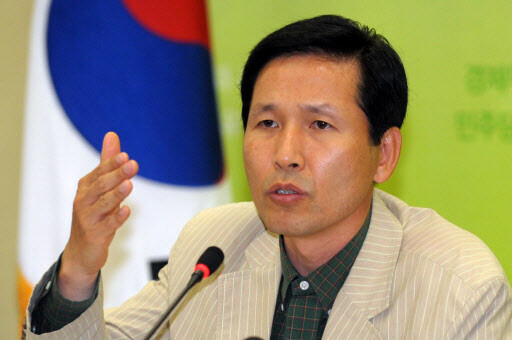hankyoreh
Links to other country sites 다른 나라 사이트 링크
South Korean government‘s hypocrisy in public enterprise reform exposed

A controversy is brewing over allegations that Park Young-joon, vice chief of staff at the prime minister’s office and a core figure in the current administration, was deeply involved together with Chun Shin-il, Sejoong Namo Tour chairman, in the selection process for the CEO of POSCO.
In a conversation with reporters Wednesday, Democratic Party lawmaker Ooh Che-chang said that Park and Chun “were deeply involved in current POSCO CEO Chung Joon-yang‘s rise.” Park was previously a subordinate of Grand National Party (GNP) lawmaker Lee Sang-deuk, the older brother of President Lee Myung-bak, while Chun, the head of the Korea University alumni association, is considered one of the president’s closest associates.
“Based on an audit of figures connected with POSCO, including outside directors, vice chief of staff Park met with then POSCO chairman Yoon Seok-man at a hotel in Seoul‘s Gangnam last November, and in late December he had lunch with emeritus adviser Park Tae-joon. Park has acknowledged both of these meetings,” Ooh said.
“On January 7 of this year, vice chief of staff Park had breakfast with then POSCO CEO Lee Ku-taek and told him that Chung, then head of POSCO’s construction arm, had been selected as a candidate for the next CEO,” Ooh added.
This intervention in the appointment of POSCO‘s new CEO exercised by both government members and President Lee’s closest associates would have taken place around the time rumors at POSCO were circulating about Lee Ku-taek‘s retirement that he would be replaced sometime between late 2008 and early 2009. There had been speculations that Lee Ku-taek, who was appointed immediately after Roh Moo-hyun was inaugurated as president and was viewed by many as “Roh’s man,” was unlikely to finish his appointment because he was on poor terms with Lee Sang-deuk.
The activity by Park Young-joon and Chun Shin-il described by Ooh in his account Wednesday took place in late 2008 and early 2009. Following his November meeting with Yoon, where discussions took place about Chung‘s candidacy as CEO, Park had lunch in Seoul with honorary POSCO chairman Park Tae-joon in December. It is known that Park Tae-joon, who has influence behind the scenes at POSCO, preferred Yoon to Chung.
Ooh voiced suspicions that Park Young-joon used this series of meetings to communicate the desires of the government regarding the appointment of the next POSCO CEO. Park attended a meeting of the National Assembly’s Special Committee on Budget and Accounts on Wednesday where Ooh asked him about the government‘s use of influence in a personnel appointment and concluded, “even Park Tae-joon did not regard Chung Joon-yang as a desirable candidate and did not approve him as the next CEO.” Ooh contended that Park Young-joon had met with him and changed his mind.
Park Young-joon defended himself, saying that he acknowledged meeting with Yoon and Park, but that he did not pressure them, contradicting Ooh’s account that presents grounds for suspecting government involvement. Lee Ku-taek abruptly announced his retirement on January 14, one week after the date of January 7 that Ooh gives for Park‘s breakfast with Lee. Within POSCO, where the prevailing view was that Lee should finish out the remainder of his tenure, many were reportedly despondent over his early retirement.
Chun Shin-il is the other key figure in Ooh’s allegations. According to Ooh‘s claims, while Chun called Yoon on January 12 to tell him President Lee Myung-bak had approved Chung as the next CEO, another phone call with the same message was made to Yoon on January 28, a day before the nomination committee met to recommend the next POSCO CEO.
“POSCO is a public enterprise. If the current administration involved itself in the CEO’s appointment in any way, then the government‘s talk about public enterprise reform and advancement plans cannot be seen as anything but hypocrisy,” Ooh commented.
Please direct questions or comments to [englishhani@hani.co.kr]
Editorial・opinion
![[Editorial] Penalties for airing allegations against Korea’s first lady endanger free press [Editorial] Penalties for airing allegations against Korea’s first lady endanger free press](https://flexible.img.hani.co.kr/flexible/normal/500/300/imgdb/original/2024/0502/1817146398095106.jpg) [Editorial] Penalties for airing allegations against Korea’s first lady endanger free press
[Editorial] Penalties for airing allegations against Korea’s first lady endanger free press![[Editorial] Yoon must halt procurement of SM-3 interceptor missiles [Editorial] Yoon must halt procurement of SM-3 interceptor missiles](https://flexible.img.hani.co.kr/flexible/normal/500/300/imgdb/child/2024/0501/17145495551605_1717145495195344.jpg) [Editorial] Yoon must halt procurement of SM-3 interceptor missiles
[Editorial] Yoon must halt procurement of SM-3 interceptor missiles- [Guest essay] Maybe Korea’s rapid population decline is an opportunity, not a crisis
- [Column] Can Yoon steer diplomacy with Russia, China back on track?
- [Column] Season 2 of special prosecutor probe may be coming to Korea soon
- [Column] Park Geun-hye déjà vu in Yoon Suk-yeol
- [Editorial] New weight of N. Korea’s nuclear threats makes dialogue all the more urgent
- [Guest essay] The real reason Korea’s new right wants to dub Rhee a founding father
- [Column] ‘Choson’: Is it time we start referring to N. Korea in its own terms?
- [Editorial] Japan’s rewriting of history with Korea has gone too far
Most viewed articles
- 160% of young Koreans see no need to have kids after marriage
- 2Months and months of overdue wages are pushing migrant workers in Korea into debt
- 3Presidential office warns of veto in response to opposition passing special counsel probe act
- 4[Editorial] Penalties for airing allegations against Korea’s first lady endanger free press
- 5Historic court ruling recognizes Korean state culpability for massacre in Vietnam
- 6Hybe-Ador dispute shines light on pervasive issues behind K-pop’s tidy facade
- 7Japan says it’s not pressuring Naver to sell Line, but Korean insiders say otherwise
- 8[Guest essay] How Korea must answer for its crimes in Vietnam
- 9Story of massacre victim’s court victory could open minds of Vietnamese to Korea, says documentarian
- 10Historic verdict on Korean culpability for Vietnam War massacres now available in English, Vietnames